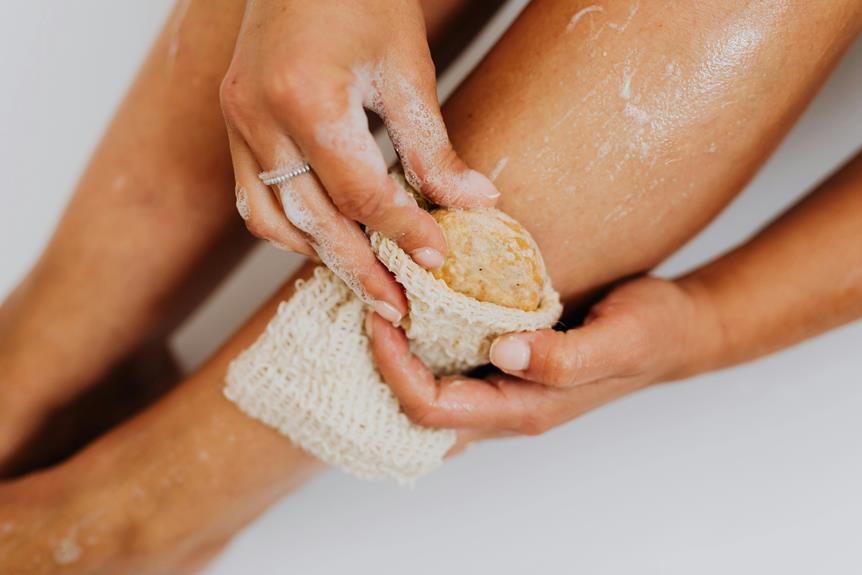
To achieve the best results with your exfoliation routine, it's essential to find the right balance for your unique skin needs. Consider how often you exfoliate: could it be too much or too little? The frequency of exfoliation plays a significant role in maintaining healthy, glowing skin, but there's more to it than just the number of times you scrub. Understanding your skin type and its reactions to exfoliation can help you determine the optimal schedule for achieving that coveted radiant complexion.
Importance of Exfoliation
Exfoliating your skin regularly helps to remove dead skin cells and unclog pores. By sloughing off these impurities, you can prevent breakouts, improve skin texture, and promote a more radiant complexion. Dead skin cells can accumulate on the surface of your skin, leading to a dull appearance and potentially blocking your pores, which can result in acne and other skin issues. Through exfoliation, you can reveal fresher, healthier skin underneath, allowing for better absorption of skincare products and a smoother makeup application.
In addition to unclogging pores, exfoliation stimulates blood circulation, which can enhance skin cell turnover and promote collagen production. This process can help reduce the appearance of fine lines and wrinkles, resulting in a more youthful-looking complexion. Regular exfoliation also aids in the prevention of ingrown hairs, especially after shaving or waxing. Overall, incorporating exfoliation into your skincare routine can lead to clearer, brighter, and healthier skin.
Types of Exfoliants
To effectively exfoliate your skin, you can choose from various types of exfoliants that cater to different skin types and concerns.
Physical exfoliants, like scrubs or brushes, work by manually removing dead skin cells. These are great for oily or combination skin, but those with sensitive skin should opt for gentler options.
Chemical exfoliants, such as alpha hydroxy acids (AHAs) and beta hydroxy acids (BHAs), dissolve dead skin cells and unclog pores. AHAs are ideal for dry or sun-damaged skin, while BHAs are excellent for oily and acne-prone skin due to their ability to penetrate oil.
Enzyme exfoliants contain natural enzymes that break down dead skin cells without scrubbing, making them suitable for sensitive skin types.
Lastly, there are exfoliating tools like sonic brushes or cleansing devices that offer a deeper exfoliation. Choose the exfoliant that best suits your skin type and concerns for optimal results.
Exfoliation Frequency Recommendations
For optimal skin health, consider the frequency at which you exfoliate to maintain a balanced and radiant complexion. Exfoliation frequency varies depending on your skin type and the type of exfoliant you use.
If you have sensitive skin, exfoliating once a week may be sufficient to avoid irritation while still benefiting from smoother skin. Normal or combination skin types can typically exfoliate 2-3 times a week to keep the skin clear and glowing. Oily skin may benefit from exfoliating every other day to help manage excess oil production and prevent breakouts.
However, be cautious not to over-exfoliate, as this can lead to irritation, redness, and damage to the skin barrier. It's essential to listen to your skin's needs and adjust the frequency based on how it responds.
Tips for Effective Exfoliation
Considering the frequency at which you exfoliate your skin, incorporating effective exfoliation tips can enhance your skincare routine for optimal results.
Firstly, choose the right exfoliant based on your skin type. For sensitive skin, opt for gentle exfoliants like mild chemical peels or enzyme-based products. If you have oily or acne-prone skin, look for exfoliants with salicylic acid or benzoyl peroxide to unclog pores.
Secondly, always exfoliate on clean, damp skin to prevent irritation and maximize the exfoliation benefits. Gently massage the exfoliant in circular motions, focusing on areas prone to dryness or congestion. However, avoid over-exfoliating, as this can damage the skin barrier and lead to sensitivity. Limit exfoliation to 1-3 times a week, depending on your skin's tolerance levels.
Lastly, remember to moisturize and apply sunscreen after exfoliating to protect and nourish your skin. By following these tips, you can achieve smoother, brighter skin with a healthy glow.




